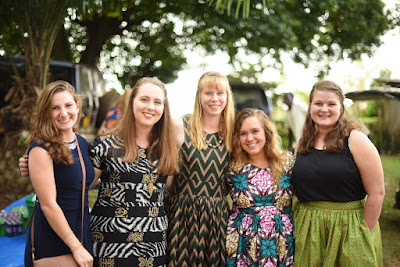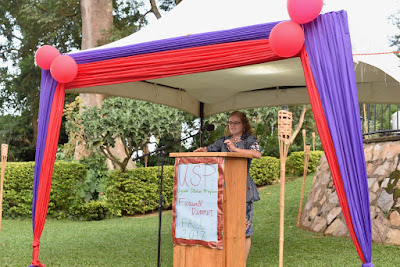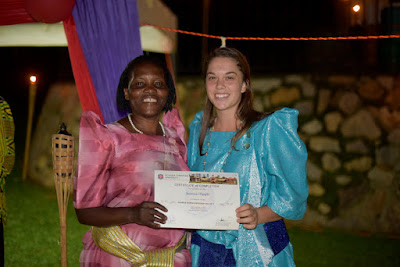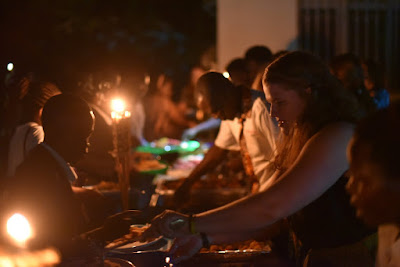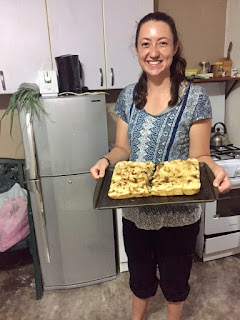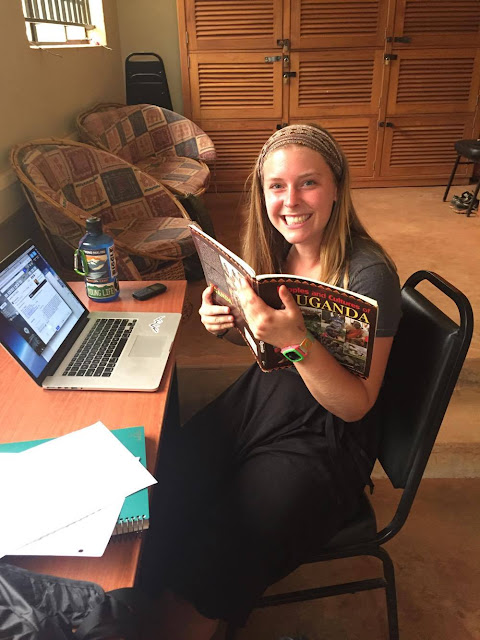USP's General Studies Emphasis (GSE) gives exciting cross-cultural learning opportunities to students from any major. The GSE is designed to provide the most flexibility in order for students to choose courses and experiences that relate to their specific interests and degree requirements, all while studying alongside Ugandan students at Uganda Christian University.
 |
| Fall 2017 General Studies Students enjoying Chapati together. |
Classes: GSE students have the opportunity to take one or more USP Core African Courses: African Literature, East African Politics, Contemporary Religions in Uganda
and African History. Students can also gain unique insights and meet general education requirements by taking Foundation Studies courses at UCU with Ugandan lecturers and students, such as Old
Testament, New Testament, World Views, Ethics and Health and Wholeness.
Practicum/ Internship:
The Cross Cultural Practicum course is an elective most GSE students opt to take, through which they gain professional and cross-cultural experience conducting an internship at a local organization, supervised by a Ugandan professional. Many students are able to obtain internship credit towards their major. Our internship partners include schools and tutoring programs, Compassion International child development
centers, children’s homes, a campus discipleship program, an international student/ESL program, as well as community-based organizations that serve the elderly, people with disabilities, and other vulnerable populations.
Living Context:
GSE students can choose whether they want to live with a Ugandan host family for the semester or on campus in the dorms with USP and UCU roommates. Both give students opportunities to build relationships and learn about Uganda through unique contexts-- by becoming a part of a family, or in relating with peers on a University campus.
Meet our fantastic General Studies Emphasis students this semester and learn how they have chosen to engage:
Jenna Comstock is a Psychology Major at Azusa Pacific University
(Studying on campus)
"As a General Studies student, I still get to explore my vocational interests as a Psychology major. My internship (through the Cross Cultural Practicum class) at Salaama School for the Blind fulfills a psychology internship required by my home University. Not to mention, my supervisor is intent on incorporating activities to help me grow as a psychologist, as well as a well-rounded culture-crosser. I get it, at first glance "General Studies" doesn't seem to translate directly to psychology, but what it really means is that USP is an all-inclusive program. You can study and live in Uganda while also moving forward in your degree at home.” ~Jenna Comstock
Rachel Land is an Education Major at Bethel University
(At home with her host mom)
“I was shocked
to find out that I could be an intern in a school through the Cross-Cultural Practicum course that USP offers. The experiences that I have had at my
practicum site are far more useful and relevant to my future vocation than I
ever would have expected.” ~Rachel Land
Julianna Kabakjian is an Elementary Education Major at Messiah College
(At home with her host brother)
“As I was
planning to come study in Uganda, I wanted to be sure that my credits would
transfer back to my home campus. I’m currently taking New Testament (which
counts for my Bible credit), Health and Wholeness (Health credit), Faith and
Action (Sociology Disciplinary Focus), and Religions of Contemporary Uganda
(another Bible credit). As a General Studies student, I had some freedom in
choosing classes, and I am glad for the opportunity to study along with Ugandans.
My major is Elementary Education and I am sure that no matter what your major
is, you can be able to find classes here that work and that you’ll enjoy.” ~Julianna
Kabakjian
Megan Beam is an International Studies and Journalism Major at
George Fox University
(At home with her host cousin)
“As a General
Studies student participating in Cross Cultural Practicum (CCP), I have been
able to experience many cross-cultural interactions and relationships which are
beneficial to me since I am pursuing a degree in International Studies. My
practicum is with an organization called Reach One Touch One Ministries (ROTOM),
where I am able to use and develop varying skills and get involved in various
communities around Mukono. I get to use my journalistic skills to write and
edit newsletters and sponsor letters at my site, providing me with the
opportunity to further pursue and practice my degree in Journalism. Taking an
African Politics course helps me meet my requirement for a politics course at
my home university as well. USP has allowed me the chance to strengthen both
degrees in various ways.” ~Megan Beam
Brooke Helder is a Business Communications Major at Trinity Christian College
(At home with her host siblings)

To be 100% honest, as a Business Communications Major coming into the USP Program as a GSE student, my expectations were high for learning, but low for expanding my knowledge about my specific major. Boy, was I wrong. Through the Cross-Cultural Practicum class that USP offers, I have been working at one of Compassion International's Child Development Centers. The work that I am doing includes spending time with different employees such as the manager, other interns, and the accountant. Trough these interactions I have learned both the behind-the-scenes and relational aspect of running a nonprofit. In addition, I am studying Religions here in Uganda which is expanding my knowledge as a Church Ministry and Leadership Minor. We are learning not only about the different religions in Uganda, but also how we should respond as Christians. We will have the opportunity to visit different religious sites, both Christian and non-Christian, such as a mosque. Overall I am expanding my horizons in ways I did not expect to and in ways that I will carry on with me after graduation." ~ Brooke Helder
The General
Studies Emphasis encompasses many unique ways of learning, through
UCU classes, at practicum sites, or living with a host family or UCU roommates. All of
these experiential learning opportunities provide avenues of growth and
development that shape student’s perspectives and help them pursue their future
career goals.
